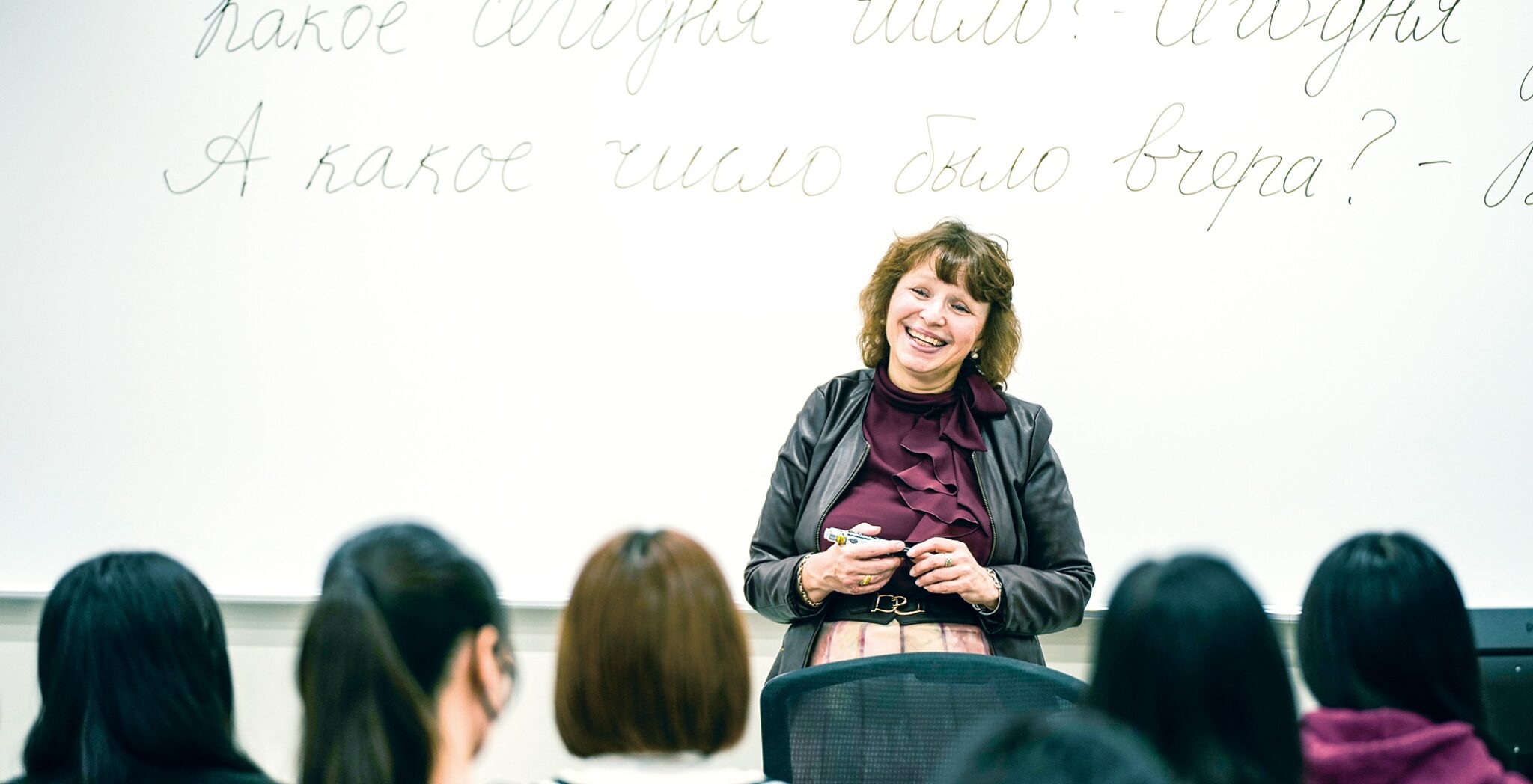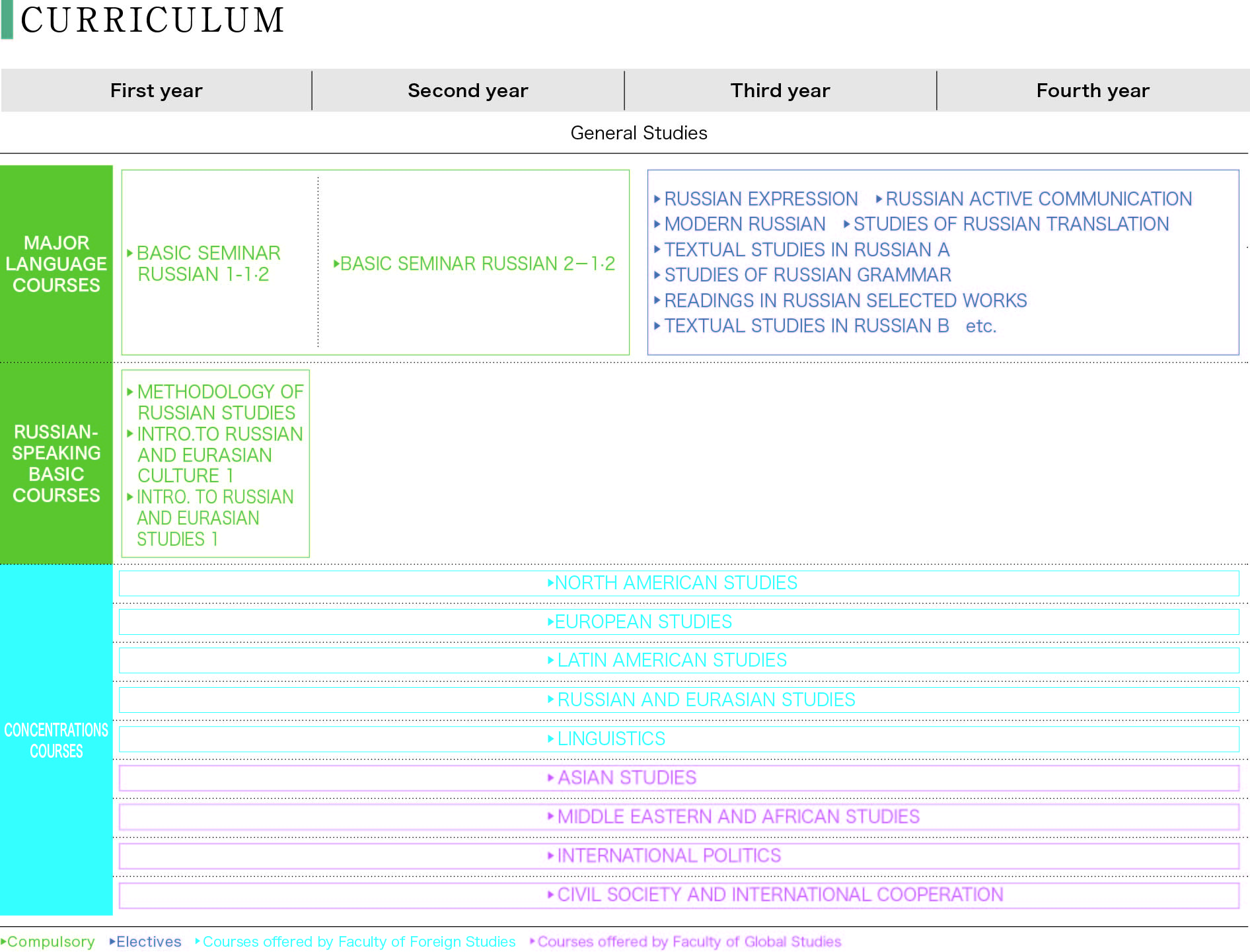Department of Russian Studies


Department Features
The department is one of the few in Japan specializing in the Russian language and Russian and Eurasian studies. In addition to acquiring functional skills in the Russian language, students can study Russia, the former Soviet Union (Baltic States, Belarus, Ukraine, Central Asian countries, Caucasus countries, etc.), and Central and Eastern Europe in a comprehensive manner. After the turmoil following the collapse of the Soviet Union, Russia and Eurasia have become increasingly important regions as a new world order is being constructed. Our goal is to produce outstanding practitioners and experts in Russian and Eurasian studies who are familiar with the realities of this region, understand the culture and spirituality of its people, and, in particular, who can proactively build their own relationships with Japan, Russia, and the rest of the world.
Harbin Institute Honors Fund
The Department of Russian Studies has a unique scholarship program, the Harbin Institute Honors Fund, which was established in the fall of 1990 by the Harbin Institute Alumni Association as an endowment for research and education in the Department of Russian Studies at Sophia University. The Harbin Institute was founded in Harbin, northeastern China, in 1920 as an institution of higher education for training Russian specialists. (Its original name was the Japan-Russia Society School.) Although the school no longer exists, some of the teachers and alumni who taught there became faculty members of the Department of Russian Studies after the war, and the alumni donated to Sophia University. The Department of Russian Studies uses the funds created from this donation to hold workshops and symposia, and to award scholarships to students in the department and a few graduate students who are researching Russia.
Curriculum
Students learn the basics of the Russian language in detail during their first and second years of study. The Basic Seminar Russian course consists of six lessons, 600 minutes per week, with first-year students taking Comprehensive, Conversation, and Grammar classes, and second-year students taking Drill, Conversation, and Reading classes, all of which are taught by native Russian speakers. In the third and fourth years, students study intermediate to advanced Russian language courses to acquire advanced communication skills. In the first year, students take courses such as Basic Russian Language Courses, which aim at understanding Russian ideas as well as the politics, economy, culture, and art of Russia and Eurasia, leading to specialized studies in one of nine research courses.
as of 2022
* Please refer to the syllabus for more information on the courses.
Course Examples
- Basic Seminar Russian I & II
The goal of this course is to provide students with the basic language skills necessary for studying the Russian language and the Russian-Eurasian region. To learn deeply, six classes per week are offered in both the first and second years.
- Methodology of Russian Studies
Students will learn the information literacy necessary to research the Russian region, from computer skills for inputting Russian, to techniques for gathering information on the Russian region, to methods for writing papers and reports.
- Russian Slavic Contrastive Linguistics
By learning about the writing, speech, and grammar of Slavic languages other than Russian (Ukrainian, Belarusian, Polish, Bulgarian, etc.) among the languages of Central and Eastern Europe, as well as the linguistic culture behind them, students will gain a relative understanding of the linguistic position of the modern Russian language.
- Russian Expression
Students will improve their speaking, writing, and listening skills through presentations in Russian. They will also learn the expressions necessary for question-and-answer sessions.
- Studies of Russian Translation
The course is designed to develop skills in translating the original language (original Japanese text) into the target language (Russian text). Students also gain a deeper understanding of the history and culture of Russian-speaking countries with the help of materials in various genres.
- Introduction to Russian and Eurasian Culture
Lectures will be given on all aspects of Russian and Eurasian culture, including language, ethnicity, history, art, literature, music, theater, and film. Students will learn the basics of Russian and Eurasian culture.
Available Teaching Licenses and Subjects
- First Category Teaching license for High School (Russian)
Curatorial courses are available.
Educational Objectives and Policies
-
To cultivate advanced proficiency in the Russian language, and impart a broad base of knowledge (of humanities, social sciences, and the basic features of the Russian and Eurasian regions) that will provide the foundations for specialized research in fields such as area studies and linguistics.
-
To produce individuals capable of contributing to increasingly globalized societies through advanced proficiency in the Russian language, and experts in research related to area studies and linguistics.
-
The Department of Russian Studies sets standards for the skills and knowledge students should acquire before graduations as described below. Those who fulfill the graduation requirements shall be deemed to have acquired these qualities and will be awarded a diploma.
The Department aims to have all students reach a level of proficiency equivalent to “B2” (level sufficient to study at an overseas university) under the Common European Framework of Reference for Languages (CEFR) at the timing of graduation and furthermore to have as many students as possible reach a level equivalent to “C1” (level sufficient to study at an overseas university).
- Abilities related to receptive activities, including “listening” and “reading” Russian
- Abilities related to productive activities, including “speaking” and “writing” in Russian
- Abilities related to interactive activities, including communicating and negotiating in Russian
- Activities related to mediating activities, including interpreting and translating Russian
- The ability to understand the history, politics, economy, society and culture of Russian-speaking areas in the context of their global status and comparisons with Japan.
-
In accordance with the Diploma Policy, the Department of Russian Studies constructs its curriculum with courses aligned with the following purposes:
- 【Major Language – Compulsory Courses (Basic Russian I, II) 】These courses aim to have students acquire basic Russian proficiency in their freshman and sophomore years. Freshmen are divided into “Grammar,” “Conversation” and “Integrated (integration of grammar and conversation)” courses taught by multiple faculty members. Students are given homework in every class and take around 25 exams annually. Sophomores are divided into “Drilling (Grammar),” “Conversation” and “Reading” courses. Students are given homework in almost every “Drilling” and “Conversation” class and take around 20 tests annually. Throughout the freshman and sophomore years, oral practice and writing and creative writing practice are repeated, and the “Conversation” class engages students in role-playing and presentations. Students are expected to proactively participate in class and to prepare for and review classwork daily.
- 【Major Language – Elective Course (Basic Russian I, II) 】These courses aim to have students use the fundamental academic skills acquired in their freshmen and sophomore years to improve their reading, listening, speaking and creative writing skills. Courses on interpretation methodologies are also offered for students who seek to become interpreters in the future. Courses are divided into “Advanced” and “Intermediate” classes, but students with an advanced level of proficiency may take Advanced courses, and vice versa.
- 【Major Language – Basic Area Studies Courses】Courses that provide basic knowledge of Russian and Eurasian culture, history, society and economy are offered as Compulsory Courses for freshmen and sophomore.
-
- . Seeks students interested in various issues associated with the language, history, politics, economy, society and culture of Russian-speaking countries and regions, and motivated to acquire a high level of Russian proficiency;
- Generally seeks students who wish to study Russian for the first time at the Department of Russian Studies, but also welcomes students with some experience in learning Russian who are prepared to be committed to enhancing their Russian proficiency through renewed systematic learning; and
- Expects students to pursue specialized studies in the discipline or geographical area chosen from the nine Concentrations offered at the Faculty of Foreign Studies, supported by their practical proficiency in Russian or other foreign languages.
Faculty Members
Shinichi MURATA Professor
Svetlana LATYSHEVA Associate Professor
